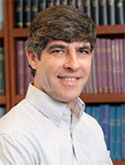GuLF STUDY Leaders

Dr. Dale Sandler
Dr. Sandler received her MPH from Yale University School of Medicine in 1975, and her Ph.D. in Epidemiology from The Johns Hopkins University School of Hygiene and Public Health in 1979. Dr. Sandler is Chief of the Epidemiology Branch at NIEHS. She studies environmental causes of chronic disease in adults. Dr. Sandler's research has looked at risk factors for breast cancer, leukemia, kidney disease, health effects of residential and occupational exposure to radon, and the health consequences of exposure to cigarette smoke and agricultural chemicals.

Dr. Lawrence Engel
Dr. Engel received his M.S. in Epidemiology in 1996 and his Ph.D in 1999 from the University of Washington School of Public Health. He is an Associate Professor in the Department of Epidemiology in the Gillings School of Global Public Health at the University of North Carolina and an Associate Scientist in the Epidemiology Branch at NIEHS. Dr. Engel's main research interests are environmental and occupational risk factors for cancer and neurologic diseases. His primary focus is on non-Hodgkin lymphoma, liver cancer, breast cancer, and Parkinson's disease.
Other GuLF STUDY Leaders
W. Braxton Jackson II, MPH, DLH, LLC.
Kate Christenbury, MBA, DLH, LLC.
Kaitlyn Lawrence, PhD, DLH, LLC.
Mark Stenzel, Exposure Assessment Applications, LLC.
Patricia A. Stewart, PhD, Stewart Exposure Assessments, LLC.
More about the National Institute of Environmental Health Sciences (NIEHS)
The National Institute of Environmental Health Sciences (NIEHS) is one of 25 Institutes and Centers of the National Institutes of Health (NIH), which is a part of the Department of Health and Human Services (DHHS). The mission of the National Institute of Environmental Health Sciences (NIEHS) is to discover how the environment affects people in order to promote healthier lives. The NIEHS achieves its mission through multidisciplinary biomedical research programs, prevention and intervention efforts, and communication strategies such as training, education, technology transfer, and community outreach.
Who is Collecting the Data for NIEHS?
DLH, a professional health research services firm, works closely with NIEHS study leaders to recruit participants, collect data, and manage the day-to-day activities of the study. More information about DLH can be found at www.dlhcorp.com.



